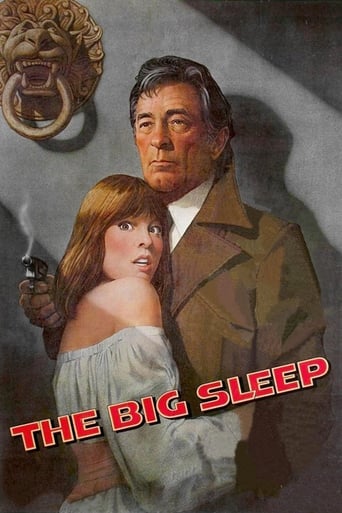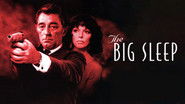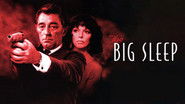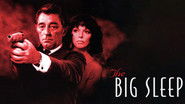skysaxon
While I haven't read the novel upon which 'The Big Sleep' is based, I have seen the Bogart version. I really love the original. Bogie-Bacall - what's not to love? However, that version does suffer from Hays Code puritanism that robbed the edge from much of human desires and sexual foibles that obviously suppressed some of the underlying desires and sexual motives.That's where the 1978 version excels - and fails. Let's start with the fails. In the original, the scenes in the bookshops near the beginning rule with Bogie's use of humour and the electric suggested tryst with Dorothy Malone's character. Sometimes the suggestion can be erotic enough. Perhaps that's why this version skips the fun and the implied sex for another more mundane approach.The other fail is the atmosphere. This version lacks any. The original's shadows and textures evoked each scene and created moods. This version lacks any specific mood to instead tell a story in almost a heightened reality. The direction does the same, relying on straight-ahead narrative more like a TV movie than a theatrical film.There's so much more here that succeeds. Despite his age, Mitchum is a fine Marlow, more cynical and world-weary than Bogart's version. The script is sharp, full of humour and wry observations. The biggest improvement is the depiction of sex. Freed of the tyranny of the forties' censorship, scenes like Carmen naked and stoned are much more realistic and make a more satisfying treatment, even if the innuendo is not as predominant.OK, it's not the classic it could've been. It's still a decent flick to rent or watch on cable. Marlowe is solid, Candy Clark is wonderfully loony, Joan Collins is pure kitsch, Richard Boone plays the essence of evil. It's good to see James Stewart, even if his gentle disposition doesn't quite match the demeanour of a General. The supporting cast are almost uniformly intriguing and fun to watch. And what a cast!The Big Sleep may be no masterpiece but it is great fun. Relax your expectations and enjoy it for what is - fine entertainment.
bobvonb
What a disappointment! Sweeping overacting and a death scene by Richard Boone out of the silent film era. It felt like the director was holding Mitchum back from a true tough guy persona. Perky 70's music just added to the trash this movie is. Read the book! These characters were not real in any sense. Unfortunately, I expected each plot twist and waited for cameos by 'stars', all distracting from the story. Everything was much too bright. This is Film Noir that isn't. Marlowe's digs were much too nice... and so were the bad guys. The bad girls were not much better. They were not flirty enough to be sexy and not half bad enough to be the evil girls they should have been. I expected Diana Rigg and Patrick McNee to pop up and announce, "Welcome to an Avengers episode".
jaibo
This remake of the Raymond Chandler novel is an object lesson in bad film-making. It should have been a contender - Robert Mitchum had been ideally cast as Philip Marlowe in 1975's Farewell, My Lovely and he is surrounded here by some high calibre talent. But British director Michael Winner so messes up the script, the direction and the mis-en-scene that the film is the very definition of poor. At times it looks as though someone has conned a load of old actors into performing in their home movie shoot. Perhaps this film is a joke on the cast, many of whom were old enough to be heading for "the big sleep" themselves and so were the butt of Winner's sick joke.Mitchum walks through the film without shaming himself too much (although he shouldn't run or fight at this age); some of the other actors give the worst performances of their career: James Stewart is beyond self-parody as the dying General; Sarah Miles lolls her tongue whilst sporting an afro perm (!), Richard Boon grimaces and growls to entirely comic effect and Candy Clark does the kind of acting one expects to see in an early John Waters film - a kind of mickey-take of acting - which is funny when Waters' cast does it deliberately but embarrassing when Clark (a promising actress previously) does it for supposedly serious effect here. A couple of the English actors, such as Richard Todd and John Mills, acquit themselves with dignity, although Edward Fox is hilariously bad in his scenes, plummy accent chewing words to pulp. Any film where Joan Collins gives one of the most convincing performances has got to be going wrong somewhere...Winner's script is a dog's dinner. He sets up the expectation that he's going to follow the convention whereby we only see and find out what Marlowe sees and finds out (a staple of detective films) and then adds random cutaways to events which Marlowe was not present at - e.g. the car going into the Thames - as well as plonking a lot of mismanaged flashbacks into the action every time anyone begins to talk about what has happened in the backstory. As usual with Winner, the film is cut with the finnesse of a village butcher, and setting the grimy noir in the posher areas of London and the English countryside does nothing to conjure the seamy world of the book.All in all, a pretty dismal addition to the list of Chandler adaptations, but worth seeing for the unintentional laughs (there are plenty) and as a lesson in how not to make a film, or what parts not to choose when you're an ageing actor.
okaycuckoo
Winner's version is more faithful to the story than the mess served up in 1946 by Hawkes, Bogart and Bacall. The switch to England is okay - maybe could have done more interesting things with it. Not sure about the switch of era. But both movies fail to use the two major characters in the story: Rusty Regan (who never appears) and Carmen Sternwood, who is pure evil. This version really tries to stick with the structure of Chandler's story, instead of whoring it out to the star names, but nobody has captured the evil and the sense of futility that Chandler wrote about. Marlowe's character dominates the drama, along with whichever actress is chosen for Bacall's original part - but he's just the wise-cracking narrator, an observer, and she's a bit-player! Cast Carmen properly, and then we'll see.







